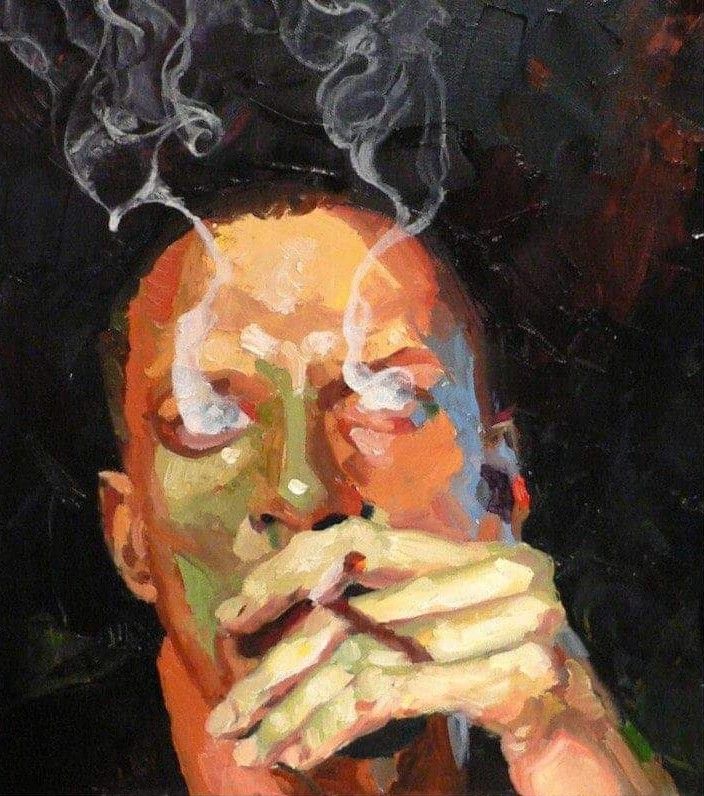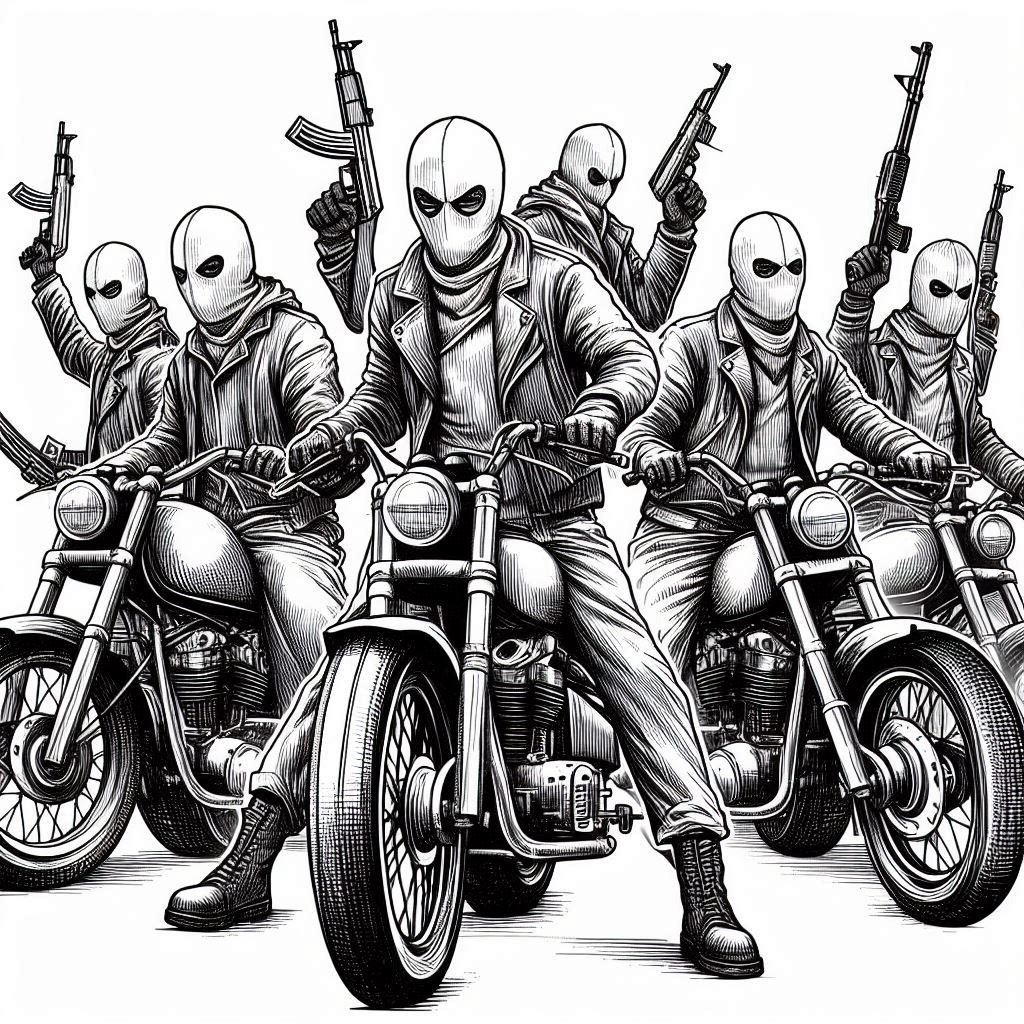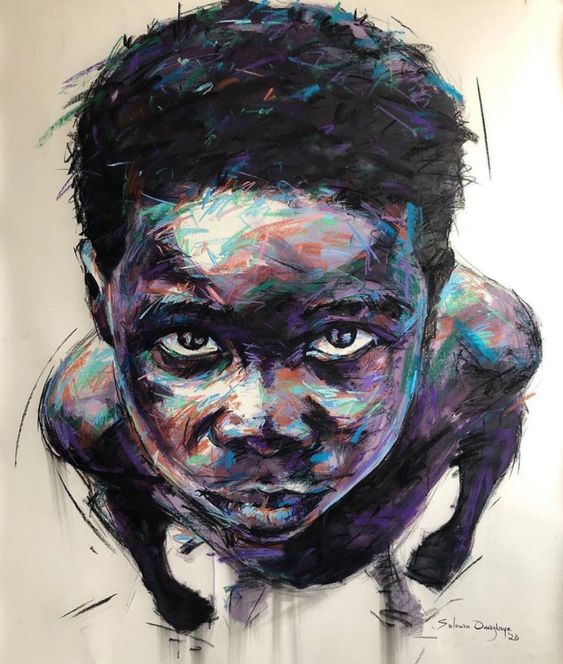Ashes Of Eko: The Man Who Smoked Himself to Death | Adewole Daniel Bamidele

Episode 01
Have you ever walked the streets of Bariga and seen them—the men who once were boys, the shadows who once had names? Have you ever stopped to ask: What dream did they chase? And at what point did it outrun them?
You knew him once. Or maybe you only saw him in passing—a silhouette pressed against the rusted body of a molue, his voice lost in the symphony of blaring horns and hurried curses. He had not always belonged to the streets. There was a time when he had a home, a mother, a place where his name meant something. But homes can be cages, and cages can kill.
He was twelve the first time he ran away. The first time he returned, he had a scar across his chin and a story he refused to tell. The second time, he stayed gone.
You would think a mother would search the ends of the earth for her son, but what happens when the earth itself is drowning her? When every breath is a fight against hunger, against rent collectors pounding on the door, against a city that does not pause for grief?
The last time he spoke to his mother, her voice trembled like a flame in the wind.
“Deji, my son, I beg you. Come home.”
He could still hear the desperation, the way her breath hitched between words. He had been sitting on a pavement in Somolu, crushing the stub of a cigarette under his foot, staring at the call screen on his battered Nokia.
“Mama, there’s no home for me there.” His voice was flat, devoid of the tenderness it once held.
“I don’t care what happened in the past—”
“But I do.” He cut her off, his throat tightening. “I care, Mama. I remember everything.”
A long silence. Then, a sigh—long, weary, carrying the weight of things left unsaid.
“Your brother is getting married.”
“Good for him.”
“He wants you there.”
“He wanted me gone too.”
She didn’t argue. She knew. They both knew.
That was the last time she called.
You watch him now, years later, moving through Lagos like a wraith. The streets have not been kind to him, but neither was the home he left behind. Here, at least, he can pretend that loneliness is freedom. That hunger is just another part of living.
But in the quiet moments, when the city sleeps and there’s nothing left to distract him, he still hears her voice. A mother’s voice, calling a son who will not return.
You watch them sit by the water’s edge that night, two ghosts in a city that never stops to mourn the living. Behind them, Lagos hums—horns blaring, voices rising, engines coughing up smoke thick enough to choke whatever dreams still linger in a man’s chest. But here, by the lagoon, the noise fades into something almost gentle, like the city is pretending to care.
Deji is hunched over, arms locked around his knees, his cigarette burning low between his fingers. He isn’t smoking it—just watching it die, like something about the slow burn reminds him of himself.
Wale lies on his back, his hand resting on his belly like someone who has eaten well—even though you know he hasn’t. His laughter is always too loud, too careless, as if he’s trying to convince himself that life is still a joke worth laughing at.
Deji breaks the silence first. “Wale, you ever reason say we fit be more than this?”
Wale scoffs. “More than wetin? More than conductor work? My guy, if you start dey think like that, na straight madness be that.”
Deji exhales, watching the smoke disappear into the night. “I used to dream, you know.”
Wale shifts, side-eyeing him. “Dream ke? You dey whine? For this Lagos?”
Deji shakes his head. “No be joke. I used to wan be writer.”
Wale blinks, then bursts into laughter. Not the kind that comes from joy, but the kind that carries something bitter, something sharp.
“Writer?” He wipes imaginary tears from his eyes. “Deji, you don high? Who go read wetin you write? Abi you wan write book for danfo passenger dem?”
Deji doesn’t laugh. He just flicks his cigarette, watching the ashes scatter like the pieces of something he once believed in. “I no sabi. Maybe somebody wey go understand.”
Wale stops laughing. For a moment, his smirk wavers. His mouth opens, then closes, like he’s about to say something but changes his mind. He sucks his teeth instead. “See ehn, all of us be story wey nobody go read. You think say Lagos get time for sentimental person? If you like dream from now till next year, e no go change anything.”
Deji shakes his head, chuckling—but it’s that kind of laughter that sounds like pain in disguise. “You dey talk like say you no go ever die.”
Wale turns his head to look at him properly now. “No be die be the matter. Na how you wan take live before you kpai.”
Deji watches the headlights of passing cars reflect off the lagoon, his face unreadable. “I just dey wonder whether anybody go remember me when I go.”
Wale sits up, snapping his fingers. “Omo, forget that one! Wetin be ‘remember’? If you dey find who go remember you, go do something wey go shake Lagos—like Jagun-Jagu
n wey tear dem Alaye for Oshodi last month. You think say na writer dem dey remember? Abeg, my guy, no dey reason nonsense.”
But you see it—the way Wale’s voice loses its edge at the end. The way his bravado falters, just slightly. Like a man who knows he’s lying, but has spent too many years pretending the lie is true.
Deji says nothing. He just nods, but you know he doesn’t believe a word Wale just said.
And that is the real tragedy.
You watch them rise from their place by the lagoon, brushing dust off their trousers as the night stretches thin around them. Wale slaps Deji’s back playfully, trying to shake off the weight of the conversation, trying to make things light again—because that’s what Lagos boys do. They laugh at the things that should break them.
“Abeg, make we go find something chop,” Wale says, stretching his arms. “I hear say Mama Sikira still get small ponmo and beans for back.”
Deji shrugs. “I no too get appetite.”
Wale clicks his tongue. “You no get appetite, but you get problem.” He sighs, dramatic as ever. “This life no hard reach the way you dey take am. My guy, na to hustle, flex small, chop where e sure, and we move. Anything wey pass like that, e no concern me.”
But you see it—the hollowness in Wale’s eyes, the way his shoulders slump when he thinks no one is looking. He talks big, but his heart is as heavy as Deji’s. Maybe heavier.
They walk through the streets, past women frying akara by the roadside, past danfo drivers shouting their routes—“Oshodi! Oshodi! Enter with your change o!”—past boys slumped against walls; eyes red from whatever poison they use to escape.
And then, like a cruel twist of fate, they see her.
Standing under the dim light of a streetlamp, balancing a tray of herbs on her head, calling out in a voice too weary for her age. “Opa eyin! Ewe akoko! Agbo jedi-jedi!”
Deji stops in his tracks.
She sees him, too. Their eyes lock.
You watch the way her lips part slightly, as if she wants to say something. But what is there to say? What words can stitch together the pieces of a mistake neither of them were ready for?
She was seventeen. A final-year student, full of promise. He was twenty, already losing himself to the streets. They were never supposed to cross paths, but Lagos does not ask for permission before it rearranges lives.
Wale, sensing the tension, mutters, “Omo, wahala dey.”
She looks away first. Turns her head, pretends not to see him. But you know she has.
Deji swallows hard. His fingers twitch, like he wants to reach out, but what would that change? What would that fix?
“You go talk to am?” Wale asks.
Deji doesn’t answer. Instead, he turns and walks away, leaving Wale standing there, shaking his head.
“Deji, you no fit dey run forever.”
But running is all Deji has ever known.
You watch him disappear into the night, shoulders hunched, the weight of something unspeakable pressing down on him. Maybe it’s regret. Maybe it’s something worse.
And you wonder—how many men like him walk these streets, carrying ghosts no one else can see?
The night breathes heavy around him, thick with the scent of burning petrol and the distant cries of market women packing up their wares. His steps are slow, uncertain, but his mind runs ahead of him, tangled in the past, caught in the things he cannot change.
He remembers the first time he saw Risi—not under the streetlamp like tonight, not with the weight of an unborn child between them. No, the first time was on a rainy afternoon when the gutters swelled and Lagos felt like it would drown.
She had been running barefoot through the puddles, her tray of herbs balanced on her head, her laughter ringing through the storm as if she had made peace with the madness of the city.
He had been sitting in a danfo, squeezed between a sweating passenger and a woman cradling a crying baby. The bus had stopped briefly, and in that brief moment, he saw her.
Saw the way her wrapper clung to her legs, saw the raindrops on her skin like tiny pearls.
And for the first time in a long time, he had felt something other than hunger or anger.
“Fine girl,” he had called out, leaning halfway out of the bus.
She had looked at him then, really looked, and something about the way she tilted her head had made his heart do something unfamiliar.
“You wan buy agbo?” she had asked, raising a brow.
He had grinned, showing teeth he rarely used for smiling. “I no get headache, but I fit pretend.”
She had laughed. And that had been it. That was how it had started.
Now, it was different.
Now, she would not look at him the same way.
He keeps walking, his fingers curled into fists, his breath uneven. Maybe he should have talked to her. Maybe he should have said something, asked about the baby, about her mother, about what she needed from him. But what could he offer? What could a man with nothing give to a woman who needed everything?
He hears Wale’s footsteps catch up behind him.
“You be big fool, you know?” Wale says, shaking his head. “You dey dodge am like say no be you dey use style find am that year.”
Deji says nothing.
Wale continues, his voice laced with something dangerously close to pity. “E don ever occur to you say na she go suffer pass? Say na she go carry this thing for nine months while you dey here dey reason life like say na you invent suffering?”
Deji clenches his jaw. “I no ask for this.”
“And she ask?” Wale hisses. “You think say you be the only person wey Lagos don cheat?”
They walk in silence for a while, stepping over potholes, past a man sleeping on a bench with his arm thrown over his eyes, past a beggar muttering prayers to no one in particular.
Wale speaks again, softer this time. “Omo, you no go fit dey run forever.”
Deji stops walking. He looks up at the sky, dark and endless, and exhales.
“I dey fear,” he admits, barely above a whisper.
Wale scoffs. “Fear? You? No be you dey always form say life no fit do you anyhow?”
Deji shakes his head. “I no fear fight. I no fear hunger. I no even fear police. But this?” He places a hand over his chest, as if trying to steady something inside him. “This one different.”
Wale studies him for a moment, then sighs. “Oya, make we go drink. I no sabi help you solve your problem, but at least paraga fit make am small.”
Deji chuckles, but it is an empty sound. “You think say everything fit cure with paraga?”
“For this Lagos?” Wale grins. “Paraga fit no cure am, but e go help you forget. And sometimes, forgetting na the only thing wey remain.”
They keep walking, the weight of the night pressing down on them, the city still roaring around them.
And somewhere in the distance, under a different streetlamp, Risi stands alone, her hand resting lightly on her belly, whispering words too quiet for anyone to hear.
And perhaps it was sad that you were there while all this transpired, and maybe sadder the day you heard of his death—Deji’s death.
They say he had just gone to “catch one stick” before his morning shift, that he had slumped somewhere behind the aboki’s kiosk, his back resting against the cracked wall like a man merely lost in thought. But he was not lost in thought. He was gone.
Gone like the embers of the cigarette still burning between his fingers. Gone like the many dreams he had once murmured under his breath, like things too fragile to hold.
No one wailed when they found him. No women tore their wrappers, no crowd gathered to mourn the loss of a life that had already been dying in pieces. They lifted him the way one lifts a forgotten thing, a burden better left undisturbed. Someone muttered about “too much Colorado,” another shrugged and said, “E don do am before na, e fit no wake this time.”
But you knew. You knew that this was not just another reckless night gone wrong. This was something deeper, something years in the making.
You remember the last time you saw him—his lips darkened from too much smoke, his eyes sunken like a man who had not seen sleep in years. You remember the way he had sat at the edge of the gutter, humming a tune that had no name, his fingers tracing invisible patterns on his knee.
“I dey hear one sound for my head,” he had said that day, voice hoarse, almost thoughtful.
“What sound?” you had asked.
“Like a song wey I forget the lyrics.”
You had laughed, thinking he was just high, but now, looking back, you wonder if that was his way of saying he was already leaving. That he was slipping away in notes too soft for the world to hear.
Risi came later, when the news had spread, when the body had been moved. She did not cry, not in the way you expected. She only stood there, her arms wrapped around herself, rocking slightly, like a woman trying to keep something inside from shattering.
“He no go come back, abi?” she had asked, her voice barely a whisper.
You had no answer. You only looked at her, then at the baby strapped to her back—his child, a boy who would never know the man whose blood ran through him.
And perhaps that was the real tragedy. Not that Deji died, but that he had been dying for so long, and no one thought to stop him.
Or maybe they did. Maybe Wale had tried, maybe Risi had hoped, maybe his mother had prayed. But Lagos swallows prayers the way the ocean swallows stones—without a trace, without an echo.
They buried him in a place no one will remember. No marble, no name carved in stone. Just another boy who became a shadow, another story lost in the wind.
And you wonder—how many Dejis has this city swallowed? How many more will follow?
And so, in the end, he became what he had always been running from—dust on the wind, another whisper in the city’s unyielding breath. No grand farewell, no voices raised in sorrow, just the quiet acceptance that Lagos does not stop for the fallen.
Perhaps he never stood a chance. Perhaps from the moment he ran from home, from the first time he inhaled the smoke that would one day consume him, the city had already written his fate.
But you remember.
You remember the boy who once dreamed of being a writer. You remember the man who hummed forgotten songs at the edge of the gutter. You remember the way he loved, the way he laughed, the way he carried his wounds like badges no one could see.
And perhaps that is enough.
Because in a city that forgets too quickly, to be remembered—even in ashes—is to still exist.








Many thanks to the Akatunka team for sharing my story!